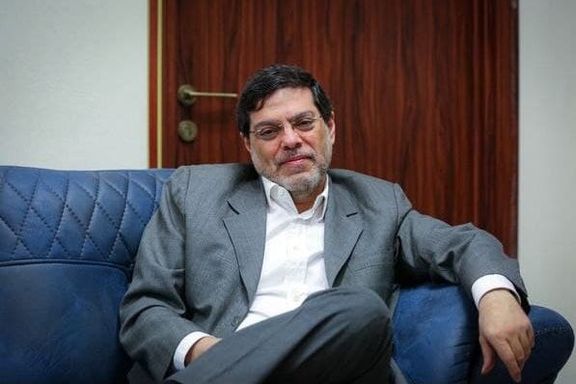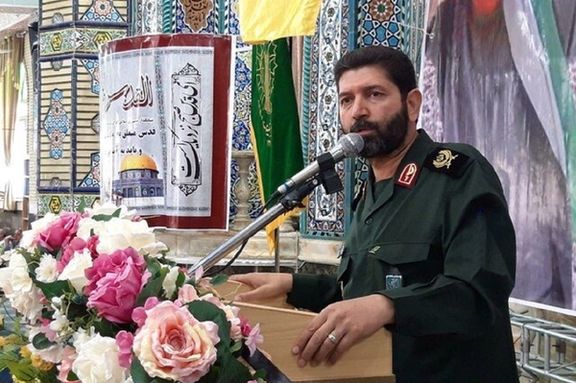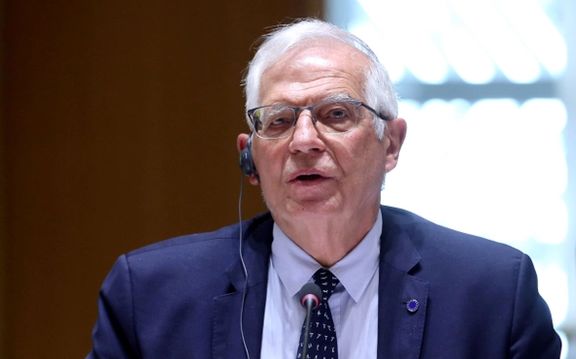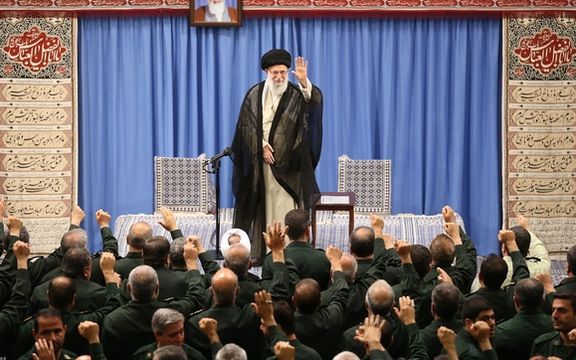Former Lawmaker Says Iran's Earlier Aim Was To Make Nukes

A former senior Iranian lawmaker has disclosed that Iran’s aim from the beginning was to produce nuclear weapons, but it failed to keep the project secret.

A former senior Iranian lawmaker has disclosed that Iran’s aim from the beginning was to produce nuclear weapons, but it failed to keep the project secret.
Speaking with Iscanews in Tehran on Sunday, Ali Motahari said that Iran’s nuclear weapons project was meant to be develop a deterrent force, but the Mojahedin Khalq (MEK) opposition group (2002).
(Hyperlink to Iscanews removed by Iran International, because original report was edited the following day, deleting most of Motahar's remarks.)
Motahari, a former deputy speaker of parliament added, “A country that wants to have a peaceful nuclear program does not start with [uranium] enrichment,” which creates the perception that the goal is making nuclear bombs.
“If we could secretly produce and test a [nuclear] bomb like Pakistan [did], it would be a great deterrent,” he said, and went on to argue that “I believe if we started something, we should have finished it.”
Motahari immediately added that “now the view of the Supreme Leader is that producing nuclear weapons is haram,” or religiously forbidden.
Motahari, who is a social and religious conservative, has been an outspoken critic of certain policies of the Islamic Republic in recent years, including restricting fair competition within the system and political freedoms.

A member of the Iranian delegation to the nuclear talks says the Ukraine war will eventually force Washington to agree to Tehran's demands and make a deal.
"Failure to reach a deal [so far] is a result of domestic troubles in the US but the ever-increasing problems caused by the Ukraine war will put pressure on [President Joe] Biden to accept the necessity of a deal [with Tehran]," Mohammad Marandi, the US-born media advisor of the Iranian delegation to the Vienna nuclear talks told the official news agency IRNA on Sunday.
Marandi claimed that none of the other parties in the talks -- the three European sides, Russia, China and Tehran -- have any problem with continuing the talks. "It has to be seen what decision Biden will make about continuing [the negotiations]," he said.
Marandi who is often interviewed as a commentator on Iran's foreign relations by the state media told IRNA that Americans admit Iran has scored 'considerable gains' in the talks. "That's why some of the members of the US delegation resigned and left the teas in protest," he said referring to the resignation of Richard Nephew, the architect of Washington's sanctions on Iran in January, and part-time senior adviser Dan Shapiro in March.
"Talks were progressing fast during the last few days but the Americans abruptly put a break to them over various issues including the lifting of sanctions and its verification, guarantees, as well as [delisting of the] IRGC," Marandi said.
Tehran insists that the designation of the IRGC as a terrorist organization was part of the Trump administration's 'maximum pressure' campaign against Iran and therefore should be reversed, but the US considers the designation unrelated to the nuclear issue.
Iranian officials reiterate that it is Washington's "excessive demands" that has prevented a deal from materializing and that Tehran will not surrender to such demands.
What the US state department has said is that if Iran wishes to discuss sanction unrelated to the nuclear issue, it should accept to widen the talks to include other outstanding problems.
Pundits now consider a deal to restore the 2015 deal, Joint Comprehensive Plan of Action (JCPOA), much less likely than in mid-March when it appeared to be only a few days away, as Tehran and Washington both insist on their positions and throwing the onus on each other.
"Chances of a deal and the restoration of the JCPOA are less than a few months ago. For any progress either the US or the Iranian side must make a compromise. It's quite possible that failing to do so could prevent a deal from being made," Karl Kaltenhaler, director of the Center for Intelligence and Security Studies at The University of Akron in Ohio told the Iranian Labour News Agency (ILNA) Thursday.
In an interview with London-based The New Arab newspaper published Friday, the US ambassador to the UN Linda Thomas-Greenfield said there was a possibility that there will not be an agreement over the restoration of the JCPOA and mutual compliance. "We're ready and they're not," she said.
She also reiterated that the Biden administration would work to ensure that Iran is never allowed to acquire nuclear weapons, suggesting that the US will use its vote, if the matter is referred to the UN Security Council, to put the brakes on Iran's nuclear program.

A Revolutionary Guard commander fears that some in Iran might surrender to the idea of limiting IRGC's power in a bid to make a nuclear deal with Washington.
Speaking before the Friday prayers in Tehran on April 22, Gen. Hassan Hassanzadeh called those elements "lowly people and those who have sold their soul to the enemy."
Hassanzadeh is a key figure although he is not often mentioned in the media. He is the commander of IRGC forces in the capital Tehran, a fearsome unit that has been often used to suppress popular protests and is tasked with defending the Islamic Republic's centers of power.
Nuclear talks with Iran have come to a standstill since March after Tehran demanded that Washington remove the IRGC from its Foreign Terrorist Organization list.
The Biden administration has said that if Iran wants sanctions relief beyond those imposed for its nuclear activities it should be ready to negotiate over regional issues, effectively meaning limiting its interventions in other countries.
Iran's Foreign Minister had said in March that IRGC commanders are prepared to sacrifice their interest for the greater interests of the Islamic Republic and forego the call for delisting the IRGC to facilitate an agreement between Tehran and Washington.
Hassanzadeh said: "I wish to tell all the enemies and mean elements who have sold their soul to the enemies that the IRGC will never and by no means be limited."
The Commander of the IRGC's naval force Alireza Tangsiri on Thursday announced that Iran will not give up its intention of seeking revenge for the killing of former Qods Force Commander Qasem Soleimani, insisting that the IRGC would never forget the idea of seeking revenge.

The commander of IRGC's ground forces Mohamad Pakpour also claimed that "even the killing of all of US leaders will not be enough as a revenge for the murder of Soleimani."
These comments by IRGC commanders come at a time when many in Iran, including politicians are disappointed with the dim prospects of an agreement that could lift economic sanctions.
Former Iranian diplomat Ghassem Mohebali told Nameh News website that the Iranian government is still not inclined to offer explanations about the contents of any draft agreement with the US side.
"This is partly because of the weakness of Iran's negotiating team and its members' lack of familiarity with the way diplomacy works," he said, adding that "putting forward matters that were not part of the 2015 deal (JCPOA) could also be another hindrance." These matters include the role of the IRGC in the region as well as Iran's ballistic missile program.
He warned that the deadlock could lead to taking Iran’s nuclear breaches to the UN Security Council, where the other side has the right to veto any decision.
Meanwhile, Hossein Shariatmadari, the editor of hardline daily Kayhan, who is close to Supreme Leader Ali Khamenei's office said in an interview with Iran's state-owned radio that "the negotiations are not likely to lead anywhere” because the US is creating other issues outside of the nuclear question.
Shariatmadari added that some countries including South Korea are undermining Iran's right and refusing to pay their debts to Tehran fearing that they might be affected by US secondary sanctions. He added that the Americans have linked some of their sanctions to the JCPOA while they have withdrawn from the agreement and are no longer part of the JCPOA.
Shariatmadari further added that the JCPOA was a golden document for the US side while it did not have any benefit for Iran.
Iranian analyst Mehdi Ayati also told Nameh News that he is not optimistic about a possible agreement with Washington, because he believes that the JCPOA ended when former US President Donald Trump pulled out of the agreement in May 2018.

The European Union foreign policy chief has expressed frustration at delay in Vienna nuclear talks between Iran and world powers.
In a phone call with Iran’s foreign minister Hossein Amir-Abdollahian Friday evening, Josep Borell said the pause in the Vienna negotiations, which broke off March 14, was not constructive and called for fresh talks between Enrique Mora, the senior EU official chairing the process, and Iran’s lead negotiatorAli Bagheri-Kani.
Iran and the United States, which left the Iran nuclear deal in 2018, are reportedly unable to agree over Washington removing Iran’s Revolutionary Guards (IRGC) from its list of ‘foreign terrorist organizations.’ Former US president Donald Trump, who took the US out of the nuclear agreement in 2018 and imposed stringent sanctions, added the IRGC to the list in 2019.
“The Biden administration should have the audacity to rectify the White House’s past mistakes,” Amir-Abdollahian told Borrell in the phone call, according to state-owned Press TV. “There is no doubt about the Iranian government’s will to reach a good, strong, and sustainable agreement…The White House should end its excessive demands and its indecision and walk down the path of realism and resolution.”
The US is only indirectly involved in the Vienna talks over reviving the 2015 agreement, the JCPOA (Joint Comprehensive Plan of Action), but its role is key in deciding which sanctions are incompatible with the agreement and thereby persuading Tehran to reverse steps in its nuclear program taken since 2019 beyond JCPOA limits.
According to Iranian media, Amir-Abdollahian told Borrell that the other participants in the talks − China, France, Germany, Russia, and the United Kingdom − were “ready to finalize agreement” on reviving the JCPOA.
Washington has said its listing of the IRGC is unrelated to the JCPOA and that it will not negotiate the delisting without Iranian concessions "outside the purview of the JCPOA,” a reference to regional security and defense issues.
The Biden administration has come under increasing domestic pressure by most Republicans and some Democrats not to remove the Revolutionary Guard from its terrorist list.
Some argue that the Trump administration designated the IRGC as a terrorist organization to complicate a return to the nuclear deal, but others citing its long list of extraterritorial activities, including support for militant groups say that the designation is well deserved.
A former Iranian diplomat, Ali Jannati, recently claimed that under former President Hassan Rouhani, Iran received a pledge from the Biden administration that to revive the JCPOA it was ready to lift all sanctions introduced by Trump, including the FTO listing of the IRGC and the 2019 executive order allowing sanctioning of individuals linked to the office of Supreme Leader Ali Khamenei. A former Rouhani official, Alireza Moezzi, argued Friday that Jannati could be right, on the grounds that American and European officials had not contradicted him.

Iran’s foreign minister says Tehran and world powers are not far from reaching a “good and lasting agreement”, but Iran will never back down from its “red lines.”
Hossein Amir-Abdollahian made the remarks in a Thursday phone call with his Syrian counterpart, Faisal Mikdad, noting that the diplomatic procedures are working efficiently in the talks to revive the 2015 nuclear deal, officially known as the Joint Comprehensive Plan of Action (JCPOA).
“The path of diplomacy works well, and we are not far from reaching a good and lasting agreement,” he said, stressing that “We continue to exchange messages with Americans through the European Union. We have repeatedly emphasized that Iran does not pay attention to [the US] excessive demands and is not willing to retreat from its red lines times”.
Tehran has refused to negotiate with Washington directly during talks in Vienna to revive the JCPOA. European powers and Russia have acted as intermediaries between the two sides.
Amir-Abdollahian reiterated that “if the United States is realistic, we are ready to finalize the agreement in the near future in the presence of the foreign ministers of JCPOA Joint commission in Vienna”.
Eleven months of indirect talks between Iran and the United States to restore the JCPOA have stalled as both sides say political decisions are required by Tehran and Washington to settle the remaining issues.

One of the main issues is Iran’s demand to remove the Revolutionary Guard (IRGC) from the US list of Foreign Terrorist Organizations as well as the removal of all ‘maximum pressure’ sanctions.
An unnamed US State Department official was quoted by Reuters as saying on Thursday that “if Iran wants sanctions lifting that goes beyond the JCPOA, they will need to address concerns of ours beyond the JCPOA.”
‘Maximum pressure’ refers to all sanctions imposed by former president Donald Trump, who withdrew from the JCPOA in 2018. While Iran has been demanding their removal as a strict condition to restore the deal, the US expressed willingness to lift only nuclear sanctions.
Trump imposed around 1,500 sanctions on Iran since May 2018, but a majority are sanctions on Iranian officials, individuals and companies for reasons other than the nuclear program. Sanctions were imposed for human rights violations, support for terror groups, violation of banking and export laws, money laundering and similar offences.
Elsewhere in their phone call, Amir-Abdollahian and Mikdad talked about the recent developments in Israel and condemned the raids on the al-Aqsa Mosque.
“We are witnessing Zionist crimes at al-Aqsa Mosque on a daily basis”, the Iranian top diplomat said.
Tensions between Israel and Palestinians have been high since the start of the Islamic fasting month of Ramadan after Israeli police entered the Al-Aqsa Mosque compound reportedly to facilitate visits by far-right Jews to the holy site. More than 300 Palestinians were arrested and at least 170 wounded during the clashes.
Amir-Abdollahian expressed hope that on the occasion of International Quds Day, an Iranian official holiday in support of Palestinians, which will be marked on the last Friday of the fasting month of Ramadan, all Muslim nations will send a powerful message in defense of Palestine and to condemn Israel’s “acts of aggression”.
Mikdad, for his part, condemned “the Israeli crimes in the Palestinian territories”, and praised the role of the Islamic Republic in supporting the Palestinian resistance.

The United States said Thursday if Iran wanted sanctions relief beyond that of the 2015 Iran nuclear deal it must address US concerns beyond the pact.
"We are not negotiating in public, but if Iran wants sanctions lifting that goes beyond the JCPOA, they will need to address concerns of ours beyond the JCPOA," a State Department spokesperson said, referring to the 2015 deal.
Iran has demanded that its Revolutionary Guard (IRGC) be removed from the US list of terrorist organization.
"Conversely, if they do not want to use these talks to resolve other bilateral issues beyond the JCPOA, then we are confident that we can very quickly reach an understanding on the JCPOA and begin reimplementing the deal," the spokesperson added. "Iran needs to make a decision."
The US spokesperson was responding to a top Iranian official who earlier said Iran will not give up on its plans to avenge the 2020 US assassination of Qods Force Commander Qasem Soleimani, despite "regular offers" from Washington to lift sanctions and provide other concessions in return.
The (Qods) Quds Force is the foreign espionage and paramilitary arm of IRGC that controls its allied militia abroad. The Trump administration put the IRGC on the State Department list of Foreign Terrorist Organizations in 2019.
"Under any return to the JCPOA, the United States would retain and aggressively use our powerful tools to address Iran’s destabilizing activities and its support for terrorism and terrorist proxies, and especially to counter the IRGC," the State Department spokesperson said.